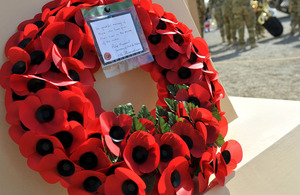Lest we forget
Armed Forces personnel who have been killed while serving their country since the First World War have been remembered today at ceremonies across the UK as well as in Afghanistan and across the world.

A wreath of poppies laid during the Armistice Day service at Camp Bastion in Afghanistan [Picture: Sergeant Steve Blake RLC, Crown Copyright/MOD 2011]
Armistice Day 2011 was marked at 1100hrs with two-minute silences held on Whitehall in London, Camp Bastion in Afghanistan and elsewhere.
Armistice Day was when peace returned to Europe at the end of the First World War. The agreement between Germany and the Allies after four years of fighting took effect from the ‘eleventh hour of the eleventh day of the eleventh month’ in 1918.
In London, a service was held for the 92nd time at the Cenotaph memorial, organised by the Western Front Association. The event was attended by members of the Victoria Cross and George Cross Association and staff from the Ministry of Defence, including the Chief of the Defence Staff, General Sir David Richards, and Chief of the General Staff, General Sir Peter Wall.
At the Cenotaph service in London, the start of the two-minute silence at exactly 1100hrs GMT was heralded by the playing of the Last Post. Its completion was marked with the Reveille.
Meanwhile, the Secretary of State for Defence, Philip Hammond, attended a service at Camp Bastion in Helmand province.
Lieutenant General James Bucknall, the Deputy Commander of ISAF forces, was also there, and laid a wreath representing all fallen British and Commonwealth personnel.

A wreath of poppies laid during the Armistice Day service at Camp Bastion in Afghanistan [Picture: Sergeant Steve Blake RLC, Crown Copyright/MOD 2011]
Senior Padre, Lieutenant Colonel Cole Maynard, officiated over the service and a bugler from 2nd Battalion The Rifles played the Last Post as all officers and warrant officers saluted. At 1100hrs a 105mm light gun from the Joint Fires Group fired one round marking the start of the two minutes’ silence and again to end it. The bugler then played the Reveille.
The troops on parade were marshalled by Warrant Officer Class 1 (Garrison Sergeant Major) D J Edkins, who recited the Kohima Epitaph:
When you go home, tell them of us and say, for your tomorrow we gave our today.
The Band of The Royal Regiment of Scotland, under Director of Music Captain P A Collis-Smith, played the music during the service.
Mr Hammond said that it was very poignant to be in Helmand province on Armistice Day, adding:
Sadly, even since I’ve been in Afghanistan we’ve lost another serviceman killed in action, so it is a very, very poignant reminder that this is not just a ceremony about the past, about history - it’s about what is actually happening today as our brave men and women face the threats that are out there day in, day out.
Back in the UK the Royal British Legion hosted ‘Silence in the Square’ in London’s Trafalgar Square, and Minister for the Armed Forces, Nick Harvey, attended an Armistice Day service of remembrance at the National Memorial Arboretum in Staffordshire.
A remembrance service at Royal Naval Air Station Yeovilton was conducted by the Archbishop of Canterbury, and 3 Commando Brigade Royal Marines, recently returned from operations in Afghanistan, held a memorial service on Plymouth Hoe, which was followed by a march through Plymouth itself.
On Sunday thousands of Service personnel and veterans will gather at the Cenotaph to take part in the Remembrance Sunday march past and remembrance ceremony.
Similar ceremonies will take place across the country and at bases in Afghanistan, as well as on board Royal Navy ships, at RAF stations and in Army barracks around the world.